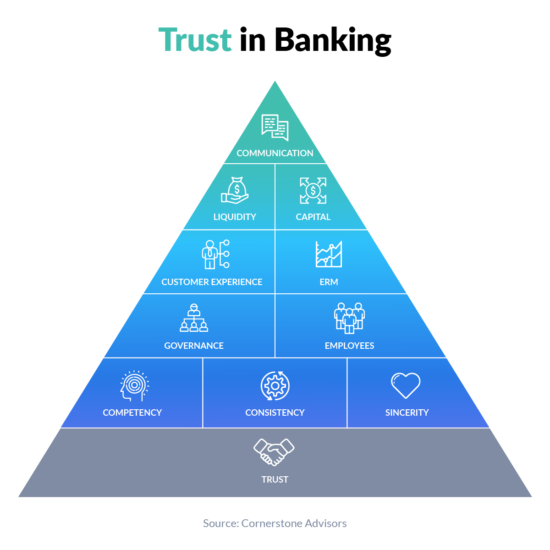

So Gonzo Bankers, are you feeling like the worst of the banking chaos is behind you, or are you peering around the corner like you’re in a classic horror-movie scene? Lately, it feels like a “B” movie where the villain has just been slain and you’ve let your guard down only to have the villain open their eyes!
The strong Gonzo Bankers have managed through the short-term challenges of slowing deposit outflows, shoring up liquidity and capital positions, and communicating with customers. Now it’s important for bankers to effectively engage their boards of directors to maintain confidence in this environment.
The Cornerstone Advisors team previously outlined a framework for banks to focus on maintaining trust from all stakeholders. Now let’s focus on how bankers can keep essential trust with their boards.

There are several areas bank executives need to address to ensure they are equipping their boards not only to maintain confidence in the direction of the bank, but also to support them as a public representative.
Here’s the brutal truth for CEOs: now is NOT the time to try to paint a rosy picture for the board. Board members are rightly skeptical of the bank’s current performance potential and its long-term business model ramifications. What board members need right now more than anything is information and facts that recognize the seriousness and urgency of the current industry environment.
Executives striving to maintain confidence with the board should consider the following four priorities:
As board members scroll headlines and hear pundits daily, it’s critical that management provides flash industry updates outlining overall industry market moves and how these shifts do or do not correlate to the bank’s specific conditions. Management will also gain credibility by keeping the board apprised of regulatory responses to the current crisis, including examination stressors, peer regulatory events and potential changes to capital, FDIC insurance and stress-testing requirements. Finally, the board will be highly interested in feedback from both customers and investors, both qualitative comments and quantified feedback through surveys and polls. It’s important to demonstrate that management is deeply engaged in responding to outside conditions and all the bank’s stakeholders.
Executives need to be crystal clear on how the path of the current economic cycle will impact bank performance, with additional metrics emphasizing liquidity, capital and deposit customer retention trends. A crisp performance dashboard should be accompanied by clear action plans. Board members want to deeply understand:
Boards understand that no management team can predict the future, but they need comfort that management is completing the hard work in “war gaming” future conditions that may unfold. Executives should prepare robust projection scenarios: a base case with the best and worst cases incorporating new variables and high-level impacts. This modeling should include asset/liability stress tests of duration and rate shocks, deposit pricing scenarios, mix changes and potential outflows vs. inflows scenarios. Executive teams that own scenario analysis as a fundamental strategic exercise and not simply a regulatory requirement will make out better in the years ahead.
The time to focus on the future is now. Bank executives have been fighting fires but can’t lose sight of the long-term goals of the bank. In fact, doubling down on long-term projections and re-upping on expected outcomes and goals that recognize current environment variables will be expected by the board. The board will want to know the impact on:
As executives mobilize to be proactive with their boards in this environment, it is also important to emphasize the role of governance. It’s an opportune time to remind the board regarding key committee structures and responsibilities and give more visibility to key areas and issues each committee should be actively tackling.
Bottom line Gonzo Bankers: a confident board is an asset, and over-communicating with them in a time of crisis with facts focused on long-term vision promotes the trust and confidence for them to do their job well.
“The less people know, the more they yell.”
-Seth Godin, Author & Entrepreneur
Anne Arvia is a principal at Cornerstone Advisors. Follow Anne on LinkedIn.